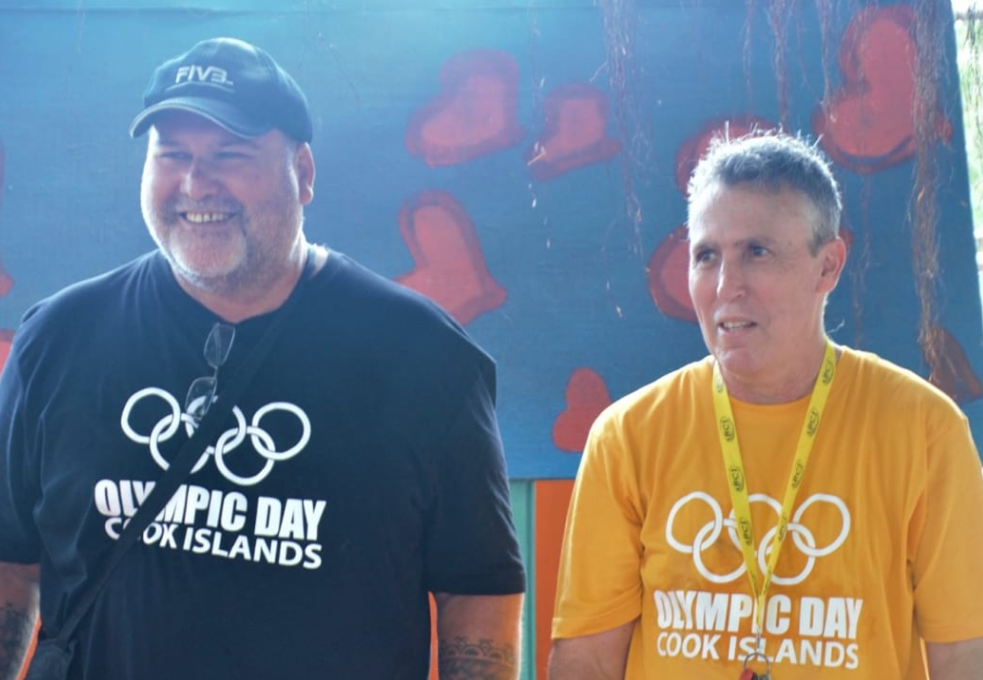CISNOC head’s remote work arrangement questioned
Saturday 2 December 2023 | Written by Rashneel Kumar | Published in

President of the Cook Islands Sports and National Olympic Committee, Hugh Graham, left, and Secretary General Owen Lewis. Photo: Facebook/Cook Islands Sports/23120202
The Cook Islands Sport and National Olympic Committee (CISNOC) has this week admitted that its secretary-general, Owen Lewis, had been granted permission to undertake contract work overseas while receiving full pay, six months after stating he was on approved leave.
The admission comes following ongoing concerns around travel arrangements and other payments for the 2023 Pacific Games, which concluded last night in Honiara, Solomon Islands.
CISNOC received funding from the government – reportedly $500,000 – which they have neither confirmed nor denied. Lewis had earlier told Cook Islands News that the funds would be allocated for athletes’ travel, insurance, medical team support, and uniform support.
However, some of the national federations the newspaper has spoken to said they are yet to receive funding for travel, which they paid for using monies raised through fundraising.
Now they are questioning whether Lewis’ absence from the country affected CISNOC’s role in dispersing the funds and other logistics for the Games.
Lewis was granted a six-month remote working agreement in January of this year after the CISNOC executive board approved a Remote Work Policy. The policy was established when Lewis requested to work remotely while undertaking contract work for an international organisation overseas.
He is due to return to the CISNOC office in Nikao in mid-December.
A senior official of a national federation, who wished to remain anonymous, questioned the board’s decision to grant Lewis his request to undertake contract work overseas while carrying out his role at CISNOC “remotely”.
“This is a poor decision by the board as you can’t be an absent CEO of a company or any organisation and be expected to run a successful organisation,” the senior official said.
“Red lights started flashing when each federation was told to sort out their own airfares and itinerary to get to Solomon Islands. CISNOC should have identified an agency that can handle all these bookings and have the power to negotiate a deal to get all teams to Solomons.
“Secondly, there was no clear policy and financial support from the government, and every federation was expected to pay full price for all fares with the hope they would get a subsidy. This matter should have been sorted months before the event and not a couple of weeks. A lot of time was spent of fundraising by all codes and even borrowing money to pay off the fares, with the hope they may get a grant.”
In May, CISNOC president Hugh Graham told Cook Islands News that Lewis was on approved leave, not sabbatical, for personal reasons.
“During his absence, CISNOC has a designated team in place to manage the organisation’s affairs and ensure that preparations for the Pacific Games are progressing smoothly. The duration of Owen’s leave and its approval were in accordance with established policies and procedures, ensuring continuity and effective management during his absence.”
This week, Graham told the newspaper that Lewis is currently under an employment contract with CISNOC, and that he has been open and transparent about his remote work situation, which was approved by the executive board.
He said Lewis’ remote work arrangement aligned with the terms of his existing employment contract, adding there is no breach of agreement, and the arrangement was made to accommodate specific circumstances without compromising the quality of service to CISNOC.
“The executive board approved Owen’s remote work arrangement after careful consideration of the organisation’s needs and the nature of his role. The decision was reached by the board to ensure continuity and effective management during his absence, without compromising the outcomes outlined in his contractual obligations,” Graham said.
“The board has continuously monitored his performance and conducted regular reviews throughout the year. Owen’s commitment to fulfilling his CISNOC obligations while working remotely has been consistent, and the executive board stands by the decision, confident in its appropriateness.
“We look forward to having Owen back on ground in mid-December.”
Cook Islands News inquired whether Lewis had applied for the short-term contract role and, if so, why he did not consider resigning from CISNOC before accepting the contract.
Lewis replied: “I did apply for the short-term contract role, and I discussed this decision with the executive board at CISNOC. I was granted the ability to work remotely, and I’m grateful for their support. Resignation was not necessary as my contractual obligations were met through this approved arrangement.”
“Working remotely has proven effective and the day-to-day operations of the office have been maintained. The executive board and I have undertaken regular reviews of the arrangement to ensure all organisational goals are met. The decision to maintain my role was taken with careful consideration and has worked.”
When questioned about whether he had applied for a senior role within the government and whether, if successful, he would request another “remote work contract” with CISNOC or resign, Lewis responded: “In the event that an opportunity for another role presented itself and I chose to pursue it, I would engage in discussions with the executive board once more. Any decision made would be in adherence to contractual obligations and with the best interests of both CISNOC and the other organisation in mind. If parties were not open to discussing a dual arrangement, I would obviously have decisions to make.”
“This is all very speculative.”
Lewis said remote work had allowed him to fulfil his duties while clearing accumulated annual leave, mitigating any liability for CISNOC.
“Covid-19 has indeed shown that remote working can be effective with the right measures in place.”















































